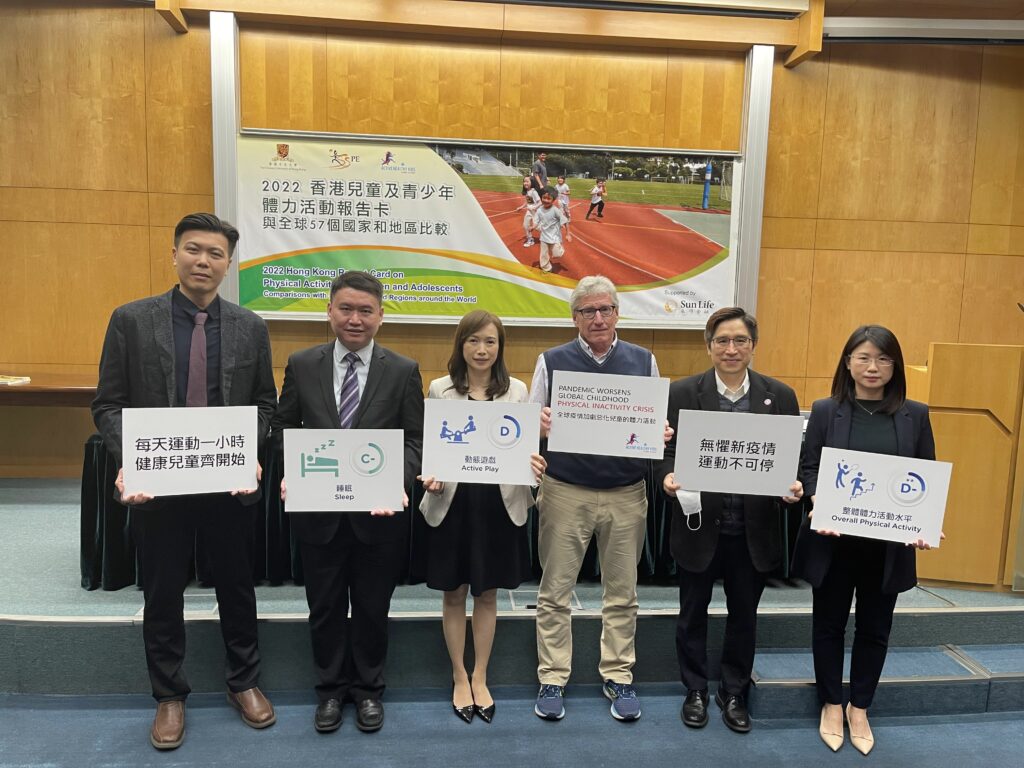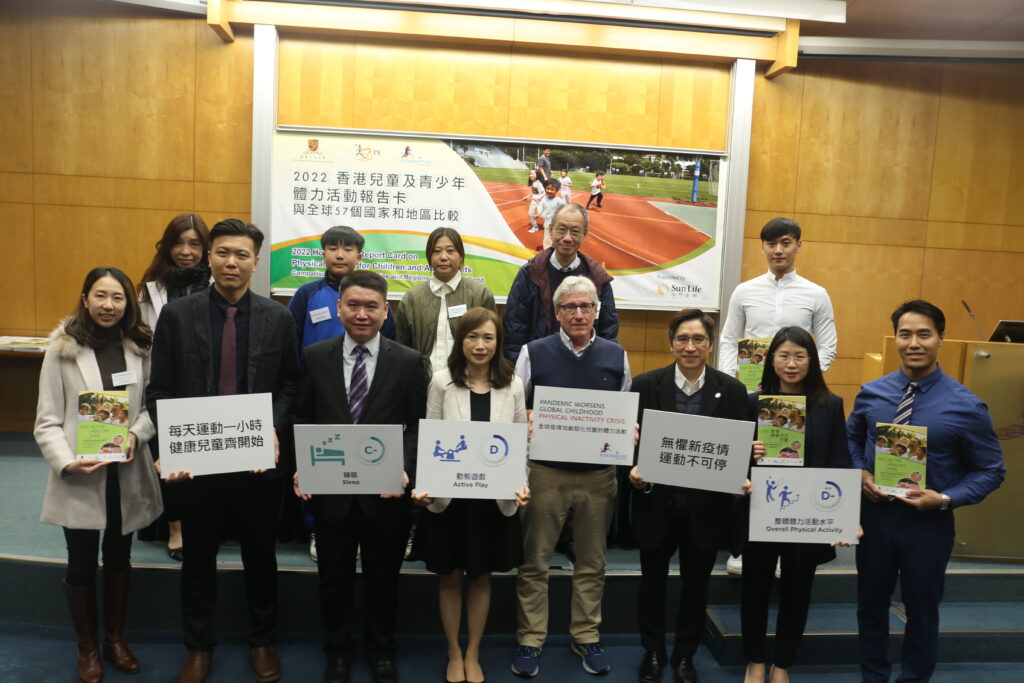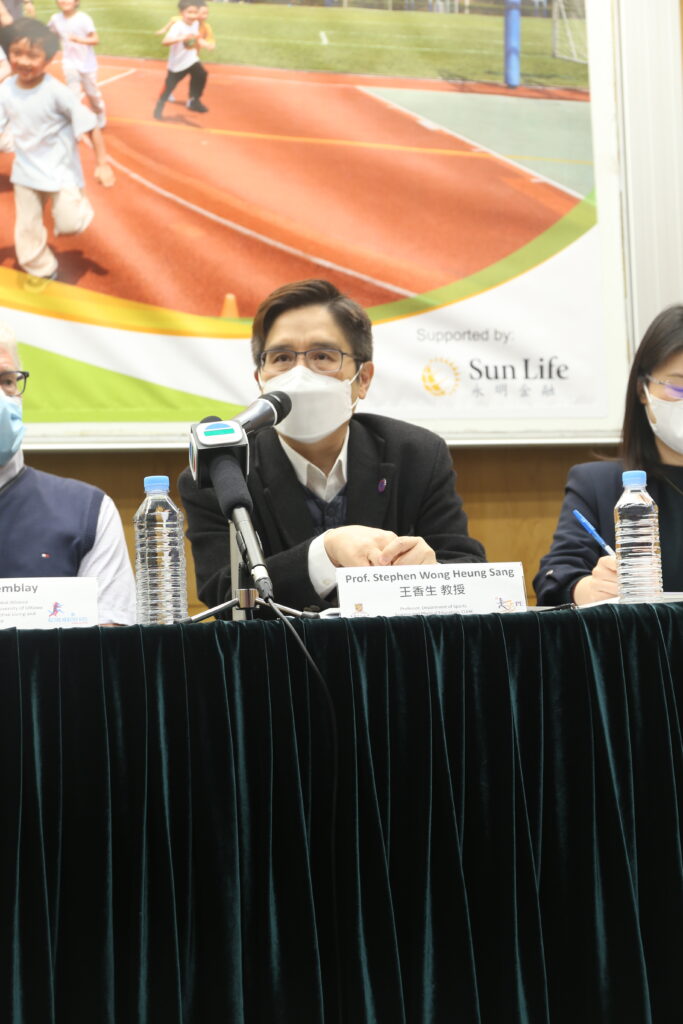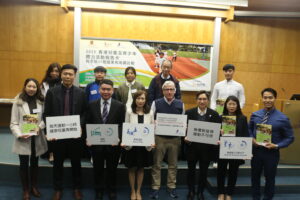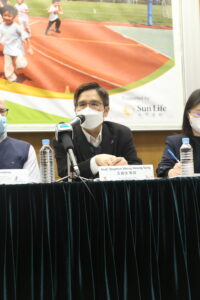CUHK
News Centre
CUHK releases 2022 Hong Kong Report Card on Physical Activity for Children and Adolescents Hong Kong children perform worst in overall physical activity and obesity
Working in collaboration with the Active Healthy Kids Global Alliance and with support from Sun Life Hong Kong, an interdisciplinary research team from the Chinese University of Hong Kong (CUHK) has released the “2022 Hong Kong Report Card on Physical Activity for Children and Adolescents” (2022 Hong Kong Report Card), the third in the series. The results show that Hong Kong performs worst in “Overall Physical Activity” and “Obesity”; scoring relatively better grades in “Active Transportation”, “School” and “Community and Environment”.
The 2022 Hong Kong Report Card assesses the current data on physical activity among children and adolescents. It provides a synthesis of the best available evidence across 12 indicators, “Overall Physical Activity”, “Organised Sport and Physical Activity”, “Active Play”, “Active Transportation”, “Sedentary Behaviour”, “Physical Fitness”, “Sleep”, “Family and Peers”, “School”, “Community and Environment”, “Government” and “Obesity”. The 2022 Hong Kong Report Card results were published together with those of 57 countries and regions with recommendations to increase physical activity among children and adolescents.
The results show that children and adolescents in Hong Kong perform worst in “Overall Physical Activity” and “Obesity” with grades of D-**(the “**” indicating that it is based exclusively on device-measured data) and D- respectively. The D- grade for “Overall Physical Activity” corresponds to 25% of children and adolescents meeting the physical activity guidelines on average, which reflects an insufficient level. This grade declined compared with the 2018 Hong Kong Report Card (C-). “Obesity” received a D-, which is the same as the 2018 Hong Kong Report Card, indicating that being overweight or obese continues to be a serious problem in Hong Kong.
Hong Kong scores reasonably good grades in “Active Transportation”, “School” and “Community and Environment”. “Active Transportation” is graded B+, which is the best among the twelve indicators. Approximately 75% of children and adolescents used active transportation to get to and from places. “School” and “Community and Environment” both graded B, indicating that over half of schools offered physical activity opportunities, and over half of parents reported living in a safe neighborhood and having sports facilities respectively. When compared with the 2018 Hong Kong Report Card, the grade of “School” improves while “Active Transportation” and “Community and Environment” remain unchanged.
The grade for “Active Play”, “Sedentary Behaviour”, and “Physical Fitness” is still low. This indicates that active play is limited, recreational screen time is high, and physical fitness is poor among Hong Kong children and adolescents. Compared with the 2018 Hong Kong Report Card, the performance in “Sedentary Behaviour” worsened from C- to D, reflecting increased use of screen-based devices for leisure purposes among Hong Kong children and adolescents in recent years. “Physical Fitness” remains unchanged, albeit with a low grade.
Based on the results of the 2022 Hong Kong Report Card, the team recommends adopting the following priorities to improve future grades:
- Enhance parental education, especially about the importance of role modelling, for supporting their children to be physically active.
- Encourage children’s active play within a safe and aesthetically pleasing community environment.
- Invest to support sport participation and sport programmes inside and outside (extra-curriculum) schools aiming at increasing physical fitness.
- Increase the availability of sports facilities.
- Use social media campaign to promote the healthy use of screens.
- Foster cross-sector cooperation between Government and non-government organisations to increase investment in physical activity promotion (for fun not for elite sport).
The 2022 Hong Kong Report Card is supported by Sun Life Hong Kong. The core members of the research team include Professor Stephen Wong Heung-sang, Professor, Department of Sports Science & Physical Education, CUHK; Dr Wendy Huang Ya-jun, Associate Professor, Department of Sport, Physical Education and Health, Hong Kong Baptist University, Professor Martin Wong Chi-sang, Professor, Jockey Club School of Public Health and Primary Care, CUHK; Professor Cindy Sit Hui-ping, Chairperson and Professor, Department of Sports Science & Physical Education, CUHK, and Dr Sam Wong Wing-sum, Executive Director, Physical Fitness Association of Hong Kong, China.
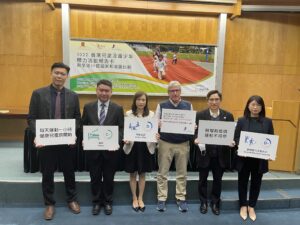
A group photo of the research team. (From left) Dr Sam Wong Wing-sum, Executive Director, Physical Fitness Association of Hong Kong, China, Professor Martin Wong Chi-sang, Professor, Jockey Club School of Public Health, and Primary Care, CUHK, Professor Cindy Sit Hui-ping, Chairman and Professor, Department of Sports Science & Physical Education, CUHK, Professor Mark Tremblay, President, Active Healthy Kids Global Alliance, Professor Stephen Wong Heung-sang, Professor, Department of Sports Science & Physical Education, CUHK, and Dr Wendy Huang Ya-jun, Associate Professor, Department of Sport, Physical Education and Health, Hong Kong Baptist University.


